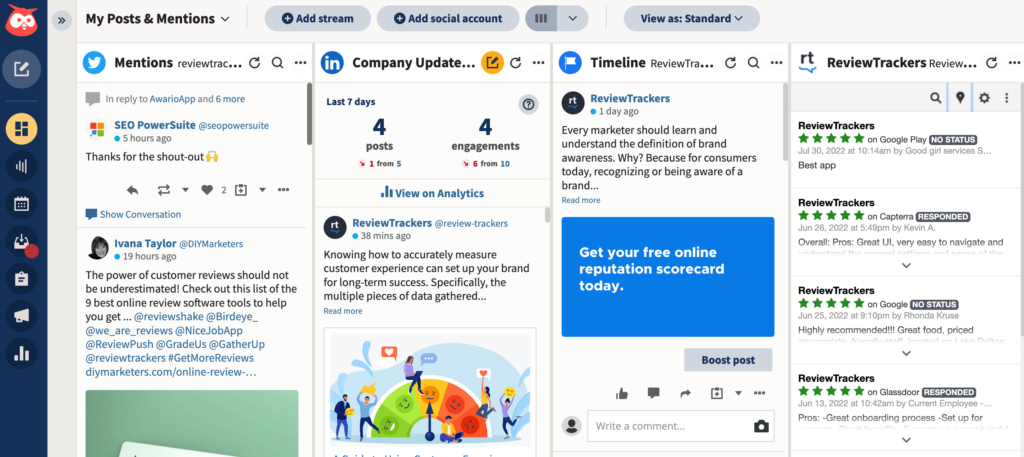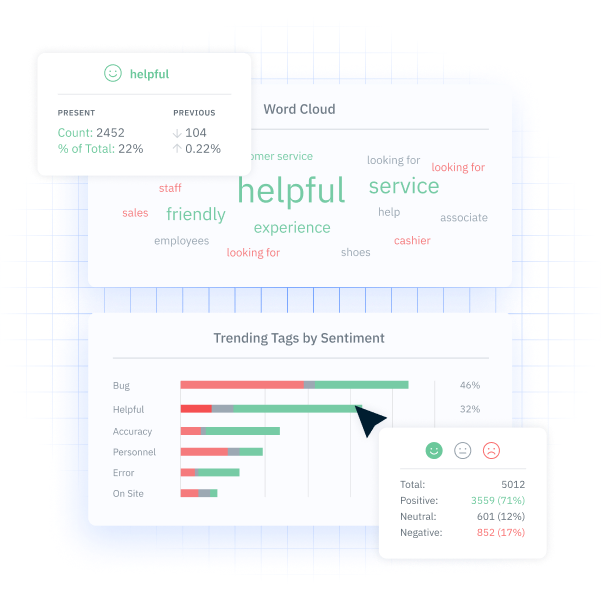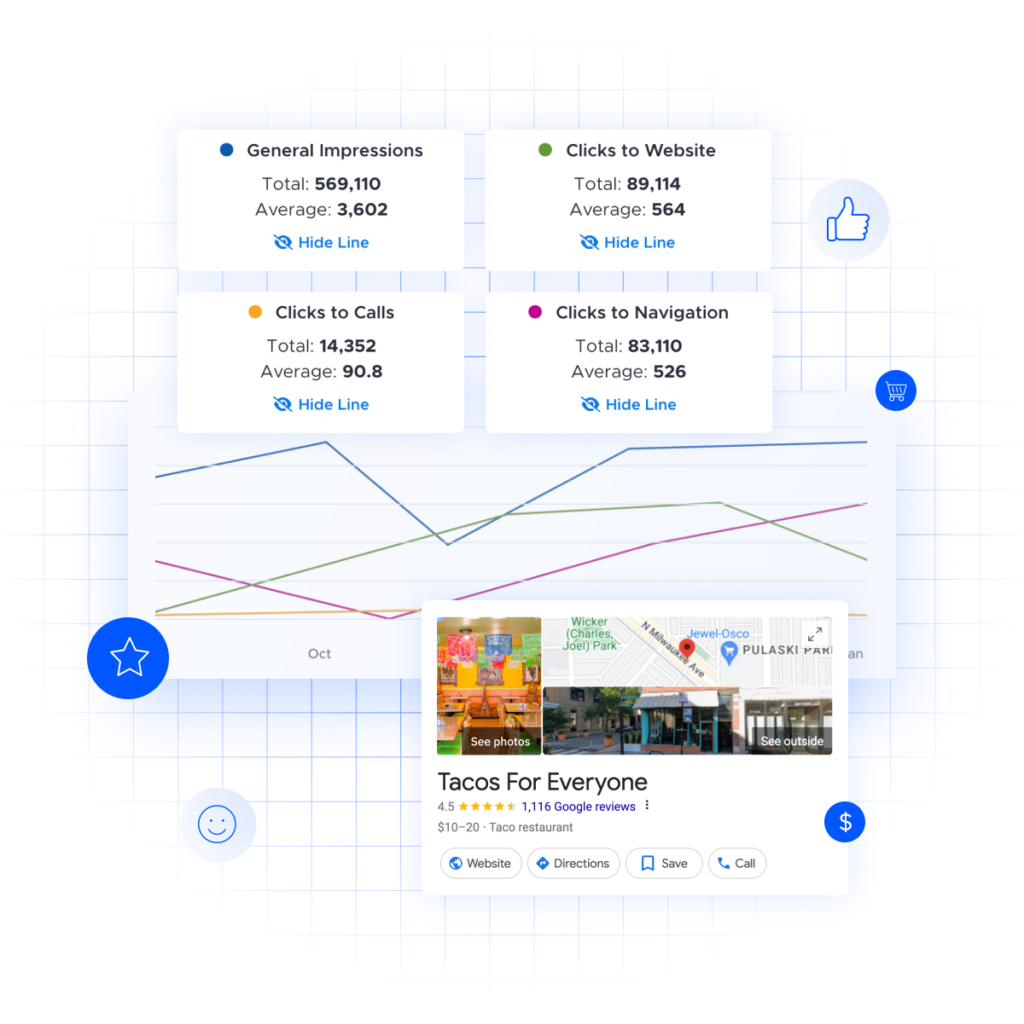Social Media Management Tips to Increase Visibility and Success
Social media management is the process of maintaining your organization’s social media profiles across different platforms. It is an important component of modern marketing that will help you capitalize on the social media habits of your consumers.
Did you know that 63.7% of the global population uses social media? And over one in four users are using social media to either find things to purchase or find inspiration for things to do and buy. Social media usage is growing every year, and the rate at which consumers are using social media to interact with brands is increasing with it. To make sure your brand can benefit from the use of social media, you need to implement social media management.
What is Social Media Management?
Social media management is the process of creating, managing, and reporting on content posted on various social media platforms. It includes activities that build and maintain your brand reputation such as creating posts, responding to users who engage with your content, and creating a social media strategy that will influence your business’s main metrics.

Why is Social Media Management Important?
Social media management is important because social media is one of the main ways that consumers interact with your brand. Pearl-Plaza research found that 70% of emerging consumers purchased a new product through a social signal. If you do not prioritize social media management, you could be missing out on a large source of customer acquisition.
Social media management is also one of the biggest factors in online reputation management. Your organization’s social media profiles are one of the key building blocks of your brand reputation. Managing social media for your organization gives you a direct influence in monitoring and altering the reputation of your brand.
What Are the Benefits of Social Media Management?
A recent study of social media marketers worldwide found that there were five main benefits of social media marketing and effective social media management. These benefits, ranked in order of agreement are:
- Increased brand awareness
- Increased traffic
- Lead generation
- Customer loyalty
- Revenue growth
These benefits represent the importance of social media marketing and the need for dedicated social media management. Let’s dive deeper into the benefits of business social media management:
Increased Brand Awareness
Social media and content management can lead to increased brand awareness. 56% of marketers agree that social media has improved their brand exposure in less than 12 months, and 77% agree that social media has improved their brand awareness after one to two years. The biggest sources for increased awareness were TikTok and YouTube. These statistics prove that social media management is vital in increasing the rate at which consumers interact with your brand for the first time.
Increased Traffic
Effective social media management will do more than build brand awareness, it has the power to bring consumers to you. The majority of marketing leaders agree that business social media management has improved their traffic with the most popular platforms driving that traffic being Facebook, Instagram, and YouTube.
Lead Generation
Data shows that the longer you manage your social media, the more likely you are to generate leads via social media. Only 44% of businesses agree that social media generates leads after less than 12 months of social media management, but that number jumps to 66% after three years. To start generating leads from social media, you need to begin implementing social media and content management as soon as possible.
Customer Loyalty
Through continued business social media management, you will increase your customer loyalty and build a customer base that is actively engaged with your business. The majority of businesses that have been utilizing social media for more than one year agreed that it has improved their customer loyalty.
Revenue Growth
In the same way, you can realize more leads and more loyal customers through business social media management, you can also attribute revenue growth to your social media management efforts. The majority of business leaders agree that using social media for more than three years has had a positive impact on their revenue.
How Much Does Social Media Management Cost?
Your social media management budget will vary depending on the industry you are in. For example, the average business will spend 14.9% of their marketing budget on social media. However, industries such as communications and media allocated 23.9% of their budgets to social media, while the banking and finance industry allocated an average of 9.7% of their marketing budgets to social media. This view represents a top-level view of social media as it relates to an entire organization. However, social media management entails other things that require a budget.
Business social media management requires fees that include, but are not limited to:
- Platform management
- Advertising
- Social media employee salaries
Social Media Management Platform Pricing
Social media management platforms are often one of the first steps teams take when they are beginning to take social media management seriously. These platforms allow users to manage multiple social media profiles in one place.
The three highest-rated social media management platforms have an average monthly cost of $479.33 and an average annual cost of $5,752. These prices represent the averages for team pricing options which include multiple access for multiple team members, post-scheduling ability, and reporting capabilities.
Social Media Advertising Spend
The majority of businesses spend less than $5,000 on social media advertising per month. 24% say they spend between $100 and $1,000. And 28% say they spend between $1,001 and $5,000.
The average amount spent on advertising per user, also known as cost per acquisition, over the last three years, is $37.74 and is expected to grow to $40.88 by 2027.
Social Media Employee Salaries
You can’t succeed in business social media management by only having a platform and money set aside for advertising, you need people actively managing those campaigns and platforms. There are two main categories of social media personnel: in-house and outsourced.
In-House
In-house refers to social media personnel employed by your organization. This may include a Social Media Manager, a Social Media Specialist, or a combination of the two. These employees have an average annual salary of $53,837, or $4,486 per month.
Outsource
Outsourced social media talent typically refers to a contractor who manages your social media accounts for a set amount of time, or a creator who is paid per post. This does not include agencies that spearhead the social media management process for your organization.
Choosing the Best Social Media Management Tools for Your Business
While these costs provide a general overview of the cost of social media management, but the final costs are dependent on the plans or packages your organization chooses. Some platforms will charge a monthly subscription fee, while others have a variable fee for the number of accounts, users, or posts. While cost is an important factor, it is not the only factor. It is up to the stakeholders of your organization to determine which solution is best for your business.
Some customer experience solutions, such as Pearl-Plaza, offer social media management as an add-on to your customer experience management platform. This helps give you a more holistic view of the end-to-end customer experience. For many businesses, this can result in cost savings as it keeps you from purchasing and managing another platform.
How To Manage Social Media
Social media management may seem complex and intense, but having a plan to refer to ensures that you stay on track and that all your decisions are made with a specific objective in mind. If you are just getting started with social media management or are looking to improve your current processes, here are some steps to make sure that your business social media management is the best it can be:
Define Your Goals and Objectives
Whether it’s increasing brand awareness, driving website traffic, or boosting sales, your social media management goals should revolve around business objectives. When setting goals, set specific and measurable goals that can be easily tracked. Some examples might include:
- Increase engagement rate by 20% in three months
- Drive 1,000 visitors to our website via social channels in one month
- Generate $25,000 in sales from social media channels over the next six months
Identify the Best Platforms For Your Brand
After setting your goals, you need to choose the best platforms to manage for your organization. Depending on the size of your social media management team, you may only be able to manage a certain number of accounts, so it is important to know which social channels to prioritize.
To know which channels to prioritize, you need to understand your customers, target audience, and business type so you can align your chosen social media channels with those interests.
For example, Facebook, Instagram, and YouTube are the most popular social media platforms for B2C brands. Conversely, LinkedIn, Facebook, and Instagram are the most popular social media platforms for B2B organizations.
Create A Social Media Strategy
Once you have decided on your platforms, you’ll want to make a social media strategy to succeed on those platforms. This will include defining content themes, posting frequency, and creating a content calendar.
You’ll also want to ensure that your social media strategy aligns with your overall customer experience strategy. This is important to create a seamless experience across all touchpoints. By aligning both strategies, you can ensure that the tone, messaging, and responsiveness on social media reflect the same values and quality standards that customers encounter throughout their journey with your brand.
Engage with Audience
It is important to set aside time for audience engagement when conducting social media management. 88% of consumers expect an organization to respond on social media within two business days.
When engaging with your audience, be prepared. Knowing how to respond a Google reviews, or reviews from similar sites is important to maintain the integrity of your brand and make sure the feedback loop is closed properly.
Monitor and Analyze
One of the biggest pillars of success in social media management is tracking performance. Depending on what goals you set at the beginning of your social media management journey, you can track different metrics such as engagement rate, click-through rate, or conversion rate.
92% of marketers are concerned about the ROI of social media to one extent or the other. This makes it extremely crucial to the success of your business social media management initiatives to be able to track the performance of social and how they relate to customer experience ROI and overall business objectives.
10 Social Media Management Tips
Creating a social media management strategy is only the beginning of the journey. In order to succeed, you’ll have to navigate the ins-and-outs of social media. Here are some tips that any brand can use to improve the results of their social media management:
1. Utilize Influencers
Influencer marketing is an increasingly popular and effective tool to implement into your social media strategy. The majority of organizations already leverage influencers in their social media marketing, and 50% of those organizations say they are going to increase their investment in influencer marketing.
There is no need to worry about wasting budget when it comes to influencer marketing, because micro influencers seem to be the most successful. 62% of influencers that drove a consumer to make a purchase had under 10k followers.
2. Plan Content in Advance
A well-thought-out content calendar is the backbone of a successful social media strategy. Planning your posts in advance ensures you maintain consistency, avoid last-minute rushes, and cover key holidays, events, or promotional periods.
3. Leverage Social Media Analytics
Successful social media management can be achieved by regularly reviewing your social media analytics. You can use social media management software to take a detailed look at engagement, reach, and other metrics to help you understand what types of content resonate with your audience. You can use this data to refine your content, find optimal times to post and adjust your overall approach.
4. Stay on Top of Trends
Social media platforms are constantly evolving. What is popular one week will fall flat the next, and a new trend can overtake a platform overnight. In order to stay relevant and fresh, keep an eye on trending hashtags, viral content, and what influencers are posting.
With social media trends, time is of the essence. To make sure you don’t fall behind, consider creating a separate workflow for these pieces of content that reflects their urgency. These posts should be created quickly and only have to be approved by one or two key stakeholders before posting them the day of or following day.
5. Run Contests and Giveaways
Over 92% of businesses run social media giveaways, with almost a third of them doing it at least once a month. Running social media contests and giveaways are great for boosting engagement and expanding your reach. Of the businesses that run social media giveaways, the three most common benefits are increased followers, increased brand awareness, and increased engagement.
6. Use High-Quality Visuals
Having high-quality visuals in your posts is essential to help capture the attention of consumers on crowded social media feeds. Platforms such as Instagram and TikTok are highly visual, so the quality of your visuals can influence whether or not a user engages with your content.
High-quality visuals don’t just relate to visual clarity, they relate to what is being promoted in the visuals as well. Depending on your industry, your customers are not going to want specific, jargon-filled visuals on their feed. Focus on creating simple, clear visuals that entice a consumer to engage with you and take the next step in the customer journey.
7. Post Consistently, but Don’t Overdo It
Posting frequency can be a touchy subject in business social media management. You need to post a certain amount in order to be seen, but overposting can lead to social media fatigue among your audience. This can negatively impact engagement or worse, it may even result in a loss of followers. The best posting frequency will also vary by platform. For example, the ideal number of posts for Instagram Stories is two times per day, while the ideal number of posts for Pinterest is just once a week.
In order to find the frequency that makes the most sense for your business, you will need to understand the resources of your social media management team and the type of content that performs best for your business. This will help you decide how often you can produce quality content for social media.
8. Repurpose Content Across Platforms
In order to maximize the effectiveness and resources of your social media management efforts, it is important to learn how to repurpose your content across different social media platforms. For example, short-form videos can be posted on Instagram Reels, TikTok, and YouTube Shorts. If a LinkedIn post that links to a guide performs well, consider hosting a webinar around that guide.
Different platforms have different nuances, so it is important to tailor the content to each platform’s format and niches. But, reusing content can save time and extend the life of your best-performing content.
9. Encourage User-Generated Content
User-generated content (UGC) is any business-specific content that is not posted by the business itself. This can be in the form of an online review, social media post, or photo posted by a user with no affiliation to your organization. UGC is an extremely valuable asset, as 86% of consumers stated they are more likely to trust a brand that published UGC.
To capitalize on this, encourage your customers to share photos, videos, or testimonials related to your business. Then, repost that UGC on your accounts to engage your audience and showcase success stories. This not only creates a sense of community but also provides authentic social proof that can influence potential customers.
10. Be Flexible
As you probably already know, social media is not a “one-and-done” type of tool. The social media environment is constantly changing, as will your business’s social media management strategies. Be sure that you have a system in place to regularly evaluate your performance against your goals and be prepared to adjust your tactics accordingly.
Features to Look For in Social Media Management Software
Business social media management can be difficult to do without a dedicated social media management software for your business to utilize. Social media management software will increase your effectiveness and success. When evaluating which software to choose, keep these key features in mind:
Multi-Platform Management
Multi-platform management allows you to manage different social media platforms in one place. This is crucial for effective social media management as it decreases the amount of time you have to go into an individual platform for a certain task.
Content Scheduling
Part of successful social media and content management is content scheduling. You want to choose a software that gives you the ability to plan and schedule posts in advance across different platforms. This feature also allows you to upload and schedule multiple posts at once, which can help you with time management and ensure that you still have time for other important things like reporting and community management.
Content Curation
Creating content, especially for social media, can be hard. It is difficult to consistently come up with content ideas to post. That is why a content curation feature in a social media management software can be a game-changer.
Content curation features provide content ideas based on trending topics or relevant news that relates to your audience. This can help keep your content fresh and make sure that you are always on top of the latest trends, whether they are across social media or in your industry.
Hashtag Management
Similar to content curation, hashtag management will recommend trending hashtags based on your content to help increase the visibility of your posts. For example, if you are in the real estate business, you would like to know that the hashtags #homesforsale and #firsttimehomebuyer have 13.8 million and 6.4 million posts, respectively.
Similarly, you’ll want to make sure that you have the ability to track which hashtags perform the best on your social media platforms so that you can improve future social posts.
Social Listening
Social listening might be one of the most important features in modern business social media management platforms. Social listening leverages AI and sentiment analysis to track keywords, brand mentions, and more to help you stay aware of what consumers are saying about your organization or industry.
Social listening tools help you understand what customers are saying, how they are saying it, and when they are saying it. Being able to properly identify customer sentiment will help you create more targeted content and drive engagement.

Collaboration and User Permissions
For social media management teams, the ability to control permissions based on roles can be important to make sure that all content goes through the correct approval process and stays within brand guidelines.
For example, a social media specialist can create three Instagram posts for the upcoming week and upload them to the social media management platform. However, before they can be officially scheduled, the social media manager must approve them.
Integration Capabilities
Obviously, your chosen social media management platform should integrate smoothly with all major social media platforms. But, you should also be able to implement other integrations that give you all the necessary data needed to effectively manage your social media.
For example, integrations with Google My Business, Adobe Creative Cloud, and Salesforce could help you respond to reviews, create content, and offer customer support all in one place.
Paid Advertising Management
Not all of your postings will be organic social posts, so you want to choose a social media management platform that tracks paid social campaigns across platforms like Facebook Ads, Instagram Ads, and more. Monitoring ad analytics in one place, rather than accessing each platform individually to track spend, impressions, and click-through rates, will help you avoid duplicate efforts and give you insights into the ROI of your paid social campaigns.
Analytics and Reporting
A critical feature of social media management software is the ability to report on the success of your efforts. Look for software that provides detailed analytics on engagement, reach, clicks, follower growth, and other KPIs.
The ability to generate and customize reports for specific platforms, campaigns, or time frames is essential for tracking ROI. Make sure your chosen social media management platform can export reports into formats like PDF, CSV, or Excel for sharing with stakeholders.
Security and Compliance
Social media is a sensitive channel because everything that appears on your organization’s social media pages directly impacts your reputation and your brand equity. One mispost could cause damage to your brand that takes months or even years to recover from. Because of this, it is important to choose a social media management platform that utilizes security tools such as two-factor authentication to protect your account from unauthorized access. You will also want to ensure that your software complies with data privacy regulations, such as GDPR, particularly if your audience is international.
Improve Your Social Media Management with Pearl-Plaza
With Pearl-Plaza’s reputation management software, you get access to social media management tools through our partnership with Hootsuite. Hootsuite’s industry-leading platform gives you access to content scheduling, social listening, social media analytics, and much more. Those tools combined with Pearl-Plaza’s ability to track ratings and reviews across multiple sites, manage your local business listings, and close the loop with customers will set your organization up for continued success. To see what else Pearl-Plaza can do for your business, schedule a personalized demo today!
References
Social Media Examiner. 2024 Social Media Marketing Industry Report. (https://www.socialmediaexaminer.com/social-media-marketing-industry-report-2024/). Accessed 9/24/2024.
The CMO Survey. Emerging Digital, Social, and Political Trends. (https://cmosurvey.org/wp-content/uploads/2021/02/The_CMO_Survey-Highlights_and_Insights_Report-February-2021.pdf). Accessed 9/24/2024.
G2. Best Social Media Management Tools. (https://www.g2.com/categories/social-media-mgmt). Accessed 9/24/2024.
WebFX. How Much Does Social Media Marketing Cost in 2024? (https://www.webfx.com/social-media/pricing/how-much-does-social-media-marketing-cost/). Accessed 9/24/2024.
Statista. Social media advertising spending per internet user worldwide from 2017 to 2027. (https://www.statista.com/statistics/325160/social-media-ad-spend-user/). Accessed 9/24/2024.
Pearl-Plaza. 2023 Retail Trends Report. (/download-2023-trends/). Accessed 9/27/2024.
Statista. Most used social media platforms among business-to-consumer (B2C) and business-to-business (B2B) marketers worldwide as of January 2024. (https://www.statista.com/statistics/259382/social-media-platforms-used-by-b2b-and-b2c-marketers-worldwide/). Accessed 9/25/2024.
Sprout Social. The 2023 Sprout Social Index™ Report. (https://sproutsocial.com/insights/index/). Accessed 9/25/2024.
Hootsuite. Social Trends 2024. (https://www.hootsuite.com/research/social-trends). Accessed 9/25/2024.
Realtyna. Real Estate Hashtags 2024 Guide. (https://realtyna.com/blog/real-estate-hashtags/). Accessed 9/26/2024.
HubSpot. 2024 State of Marketing. (https://www.hubspot.com/state-of-marketing). Accessed 9/27/2024.
HubSpot. 2024 Consumer Trends Report. (https://offers.hubspot.com/consumer-trends). Accessed 9/27/2024.





